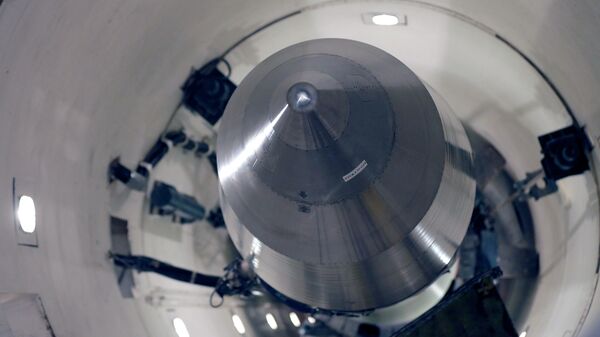Sputnik discussed this with Ramesh Thakur, Director of the Centre for Nuclear Non-Proliferation and Disarmament at the Crawford School at The Australian National University and co-Convenor of the Asia-Pacific Leadership Network for Nuclear Non-Proliferation and Disarmament.
READ MORE: Mogherini Says Work Continues on EU System Bypassing US Sanctions Against Iran
Sputnik: What do you think is the main driving force behind Germany's proposal? What goals and interests does Berlin seek to achieve?
Ramesh Thakur: I think there are three sets of considerations. The first is that arms control agreements have not been renewed, some are falling apart and President Trump has said that the US will withdrawal from the INF, which was the first disarmament agreement of the nuclear age. The New Start, as we understand, Russia has been pushing to extend for five years, the Americans have said no. So there is, in other words, a sense that arms control agreements are coming to an end, their own end of history. We need to look at that, because we believe that arms control agreements, particularly in the nuclear field, have served a very vital, stabilizing purpose in the past, through the Cold War and beyond, so that's the first set of issues.
The second set is that we have had a series of technological developments and the arms control agreements really haven't kept pace with that in the sense that we've seen an increasing blurring, for example, of the boundary between conventional weapons and nuclear weapons with technological advances which then affects the normative boundary between the two as well. We've seen an increasing blurring of the distinctions between tactical, strategic, regional, global, increasing blurring of the boundaries between the nuclear, cyber and space domains. And, as I said, we haven't really addressed these true nuclear arms control agreements relevant to this age.
And the final element in that also, just in the second set of reasoning, is that the dyadic bilateral relationship of the Cold War era between Moscow and Washington, which determined the shape of the entire nuclear arms control architecture, is now obsolete ande have interlinked nuclear chains. You start, for example, in the subcontinent, you go from Pakistan to India, once you bring in India you also have to bring in China, when you talk of China you also have to talk about the to bring in the United States. So it becomes a interlinked, seamless chain rather than a dyadic relationship, and you see that certainly in the North Korean sense, so that's a second set of reasoning. The third set is that there has been a fairly dramatic fall in confidence in the responsibility of the decision-making on nuclear issues by the Trump administration.
We see this within the United States, we see this in Europe, we see it around the world. As a combination of the diminished faith in the US nuclear umbrella, plus the increased anxieties about the possibility of irresponsible nuclear decision making, combined with a rise in geopolitical tensions, particularly in Europe, there's been a feeling in Europe that they need to start asserting themselves and take some leadership, if necessary, independently of the United States. And we saw that streak of independence, of course, when the Americans pulled out of the Iran nuclear agreement as well, so there's all those things mixed up in there.
READ MORE: Dollar Becomes a 'Weapon for US', Challenges EU Sovereignty — Iranian Deputy FM
Sputnik: How much is the rest of Europe on board with the proposal from Germany, especially considering Macron's recent calls for a European army as well? We know historically that Ireland and Holland, for example, are rather indifferent towards the question of the European army. I'm sure it's the same in terms of this new proposal from Germany as well, what's your thoughts with regard to that one?
Ramesh Thakur: I suspect a lot of this will be (on hold) before the whole Brexit formula is clear. Because, of course, you have two European powers that have nuclear weapons — the United Kingdom and France. If the United Kingdom withdraws from the European project, and the terms of that withdrawal are yet to be determined, that will have significant repercussions for politics and security policy also.
There's one thing that I would add, in a way it's a pity that the leaders of the 20 systemically more significant countries, that met for the G20 in Buenos Aires recently, that they didn't take advantage to look for a collective reaffirmation of the old Reagan-Gorbachev line that a nuclear war cannot be won and must never be fought. Even if the United States didn't joined it would be good to have that said by all the other 19 participants in the G20. So, I'm sorry that was a missed opportunity and the G20 is still focused narrowly on economic matters, because it is a steering group of the most important countries in the world.
The views and opinions expressed by the speaker do not necessarily reflect those of Sputnik.



